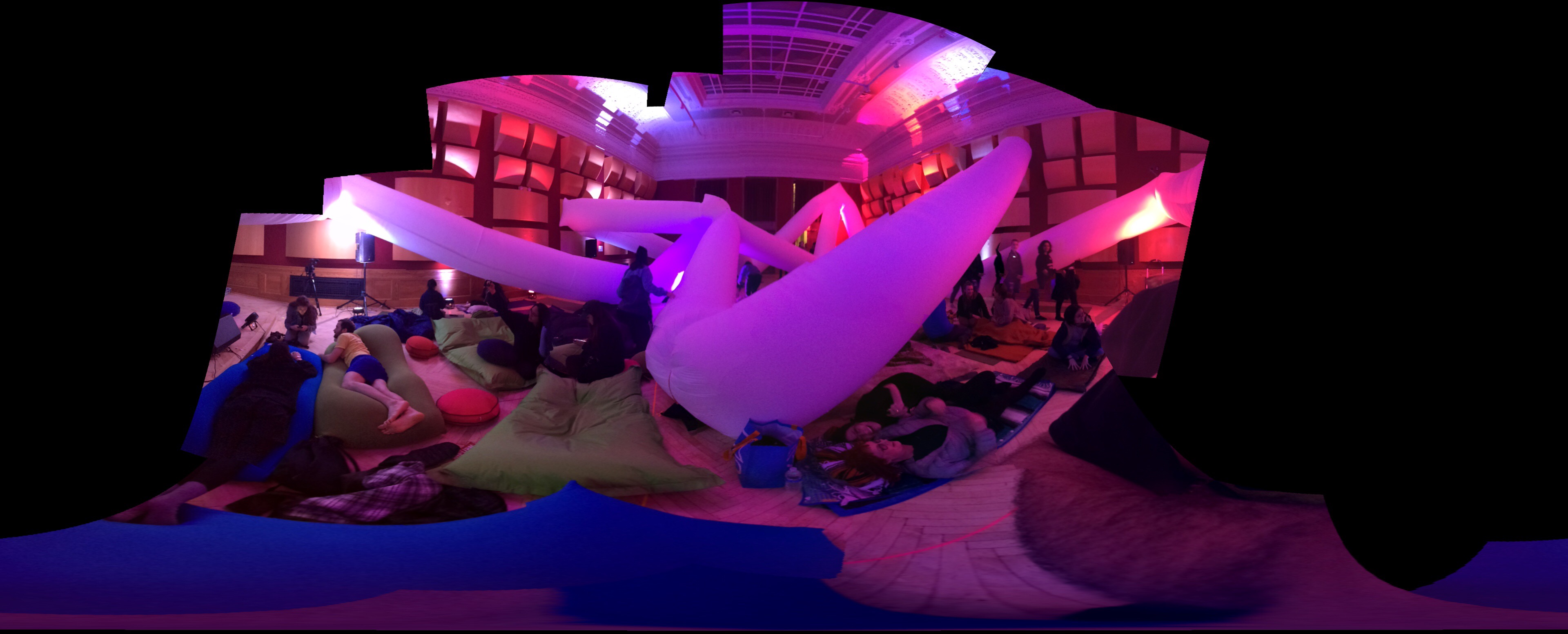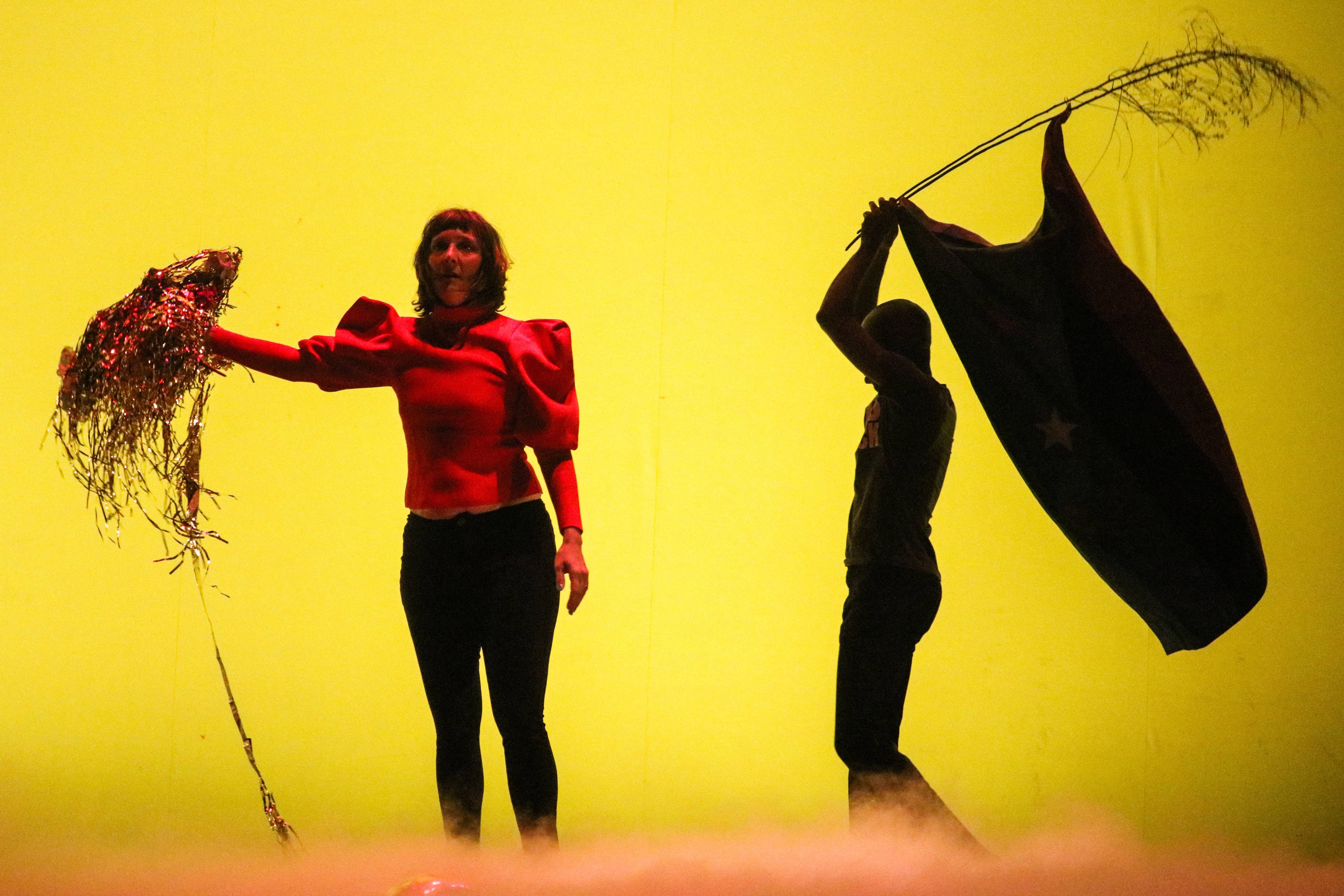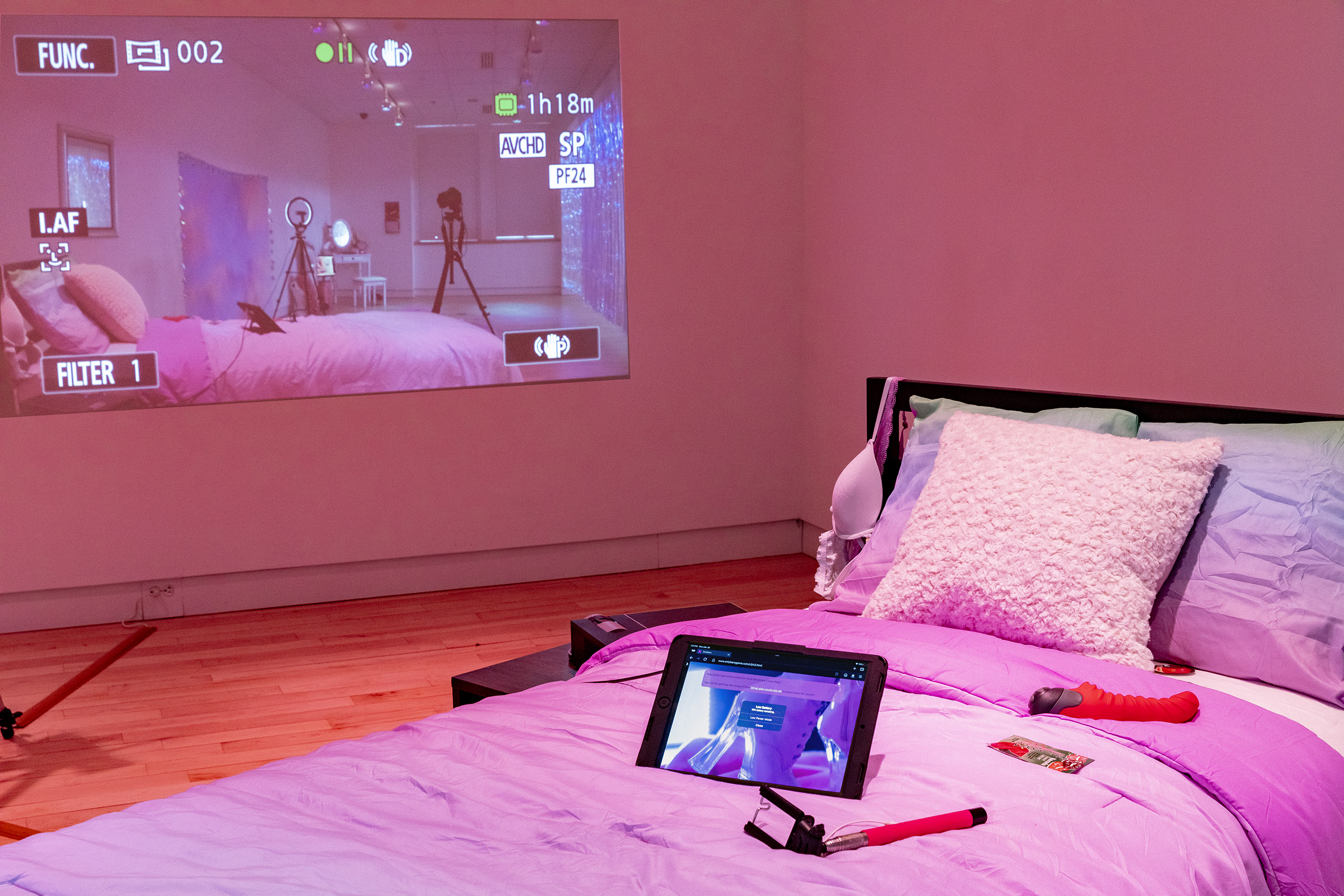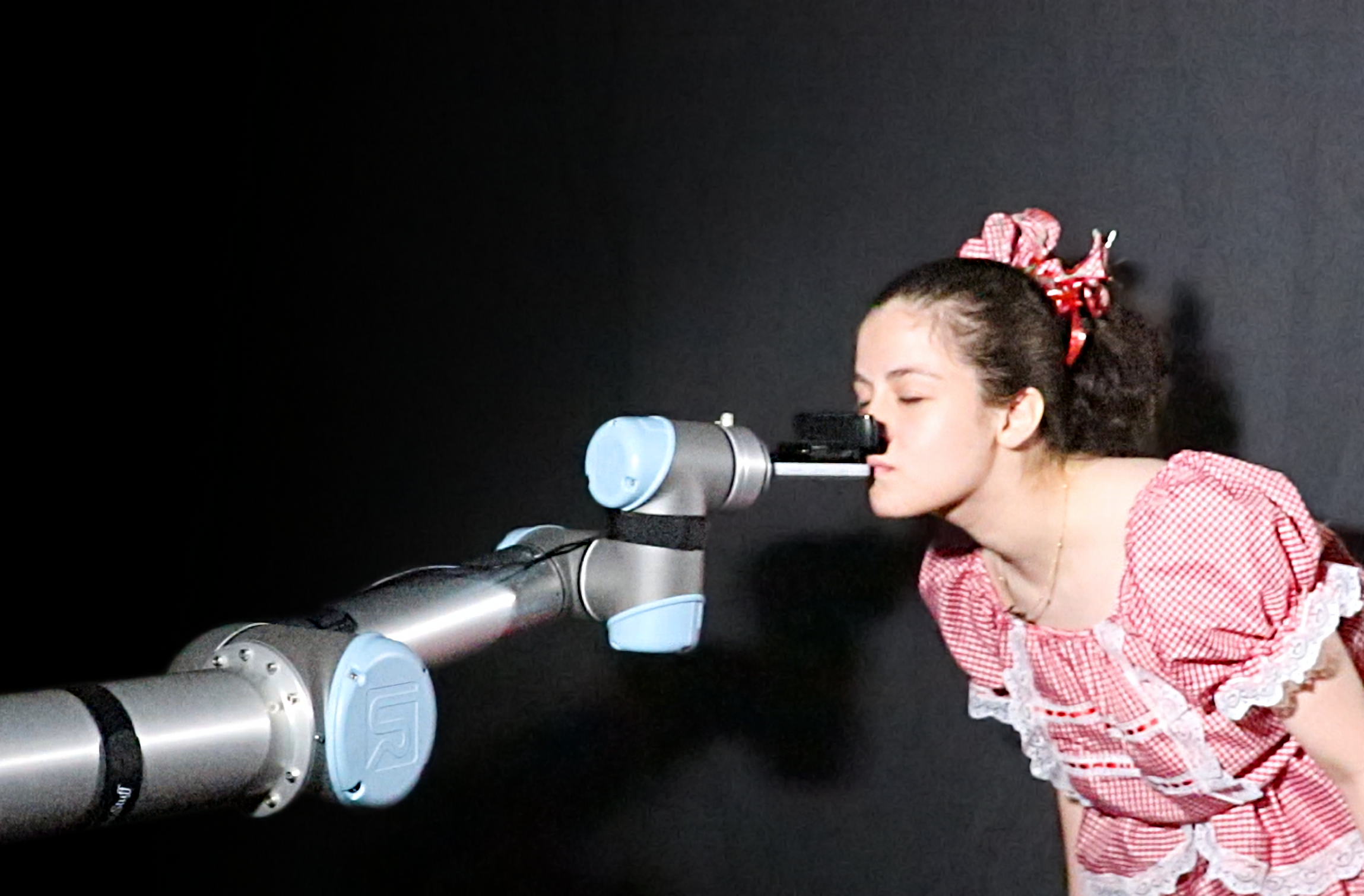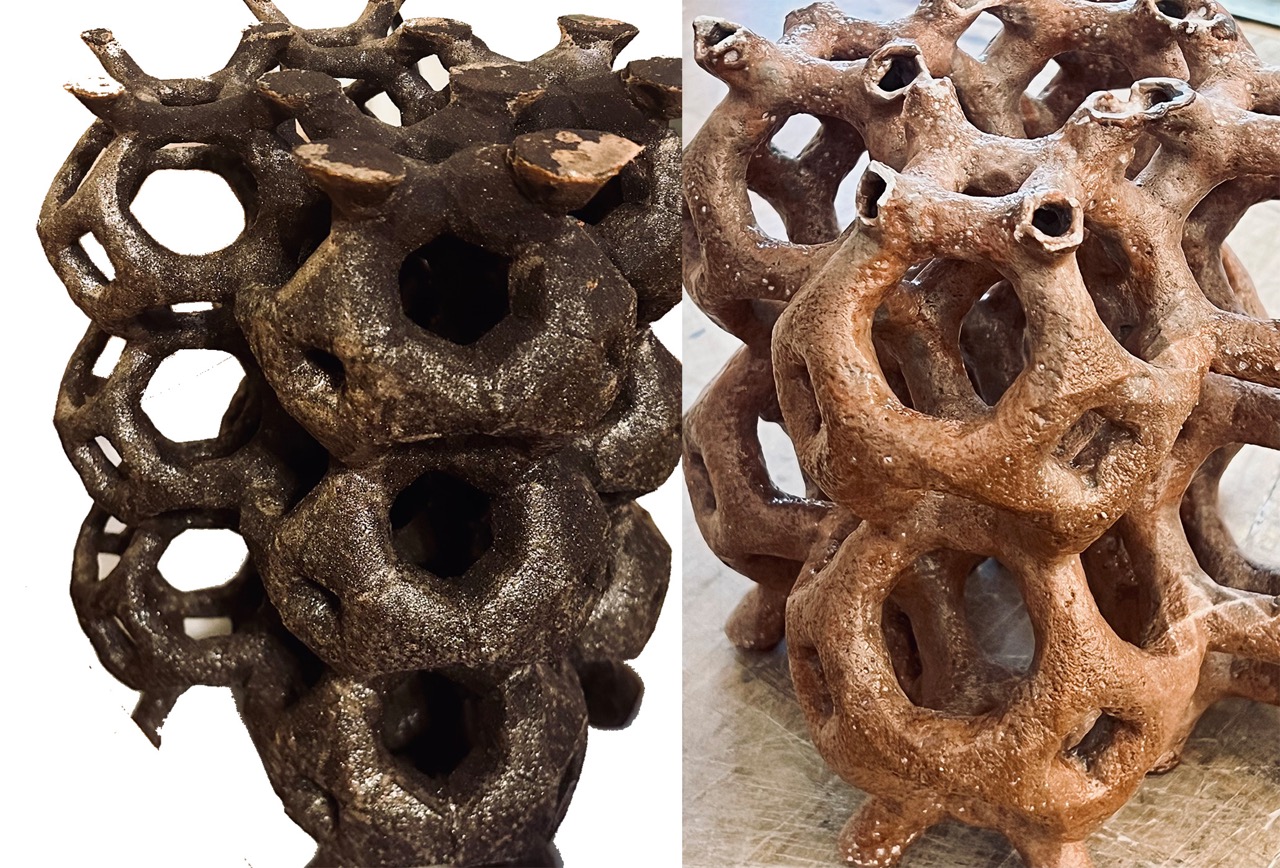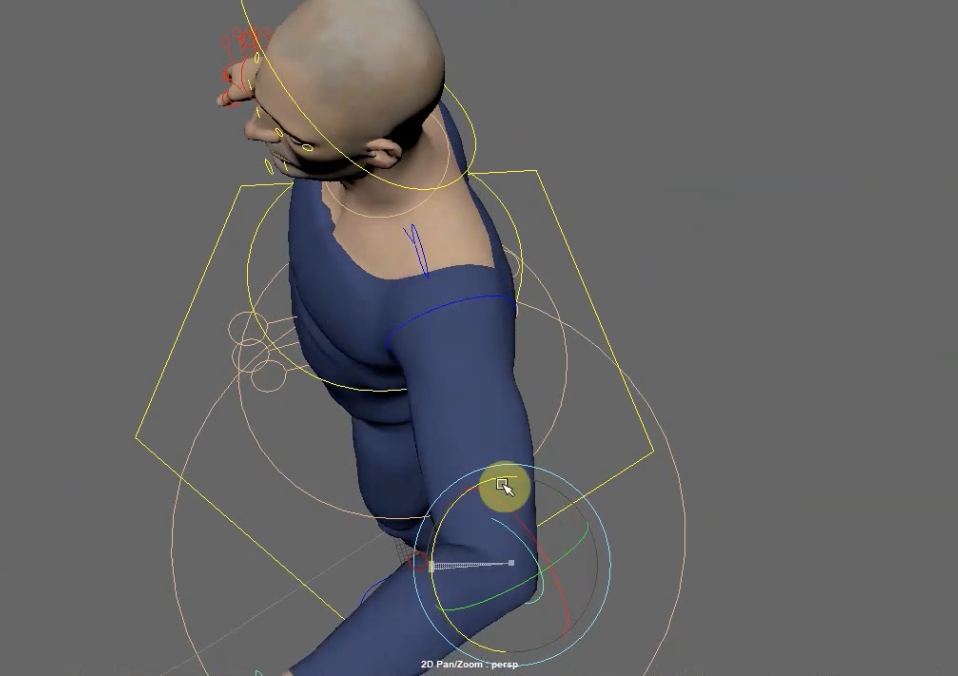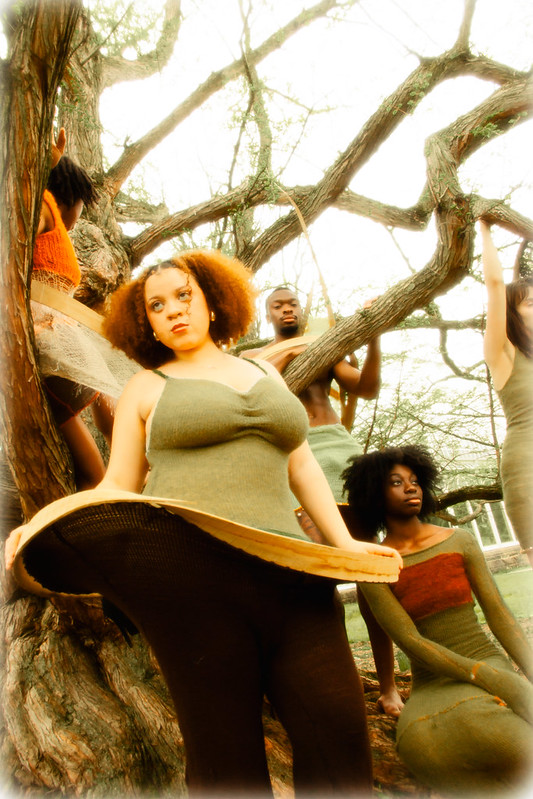2021-2022 Steiner Invitational Speaker Series
The Sylvia and David Steiner Speaker Series brings creative practitioners who push boundaries, defy definition, and demonstrate excellence in all aspects of the arts, to our campus for deep engagement with our students and faculty. The Steiner Speaker Series is administered by the Frank-Ratchye STUDIO for Creative Inquiry with the assistance of an advisory committee comprised of faculty from around the university.
During Fall 2021 and Spring 2022, the STUDIO resumed in-person programming, while continuing our support for CMU faculty, staff and students to bring a guest lecturer of their choice to visit Carnegie Mellon. Nominations were sought that aligned with the goal of the Steiner Speaker Series: to bring creative individuals to CMU to share diverse perspectives and expertise that cut across the arts, science, technology, and culture, and who are working to address our current moment in timely ways. The Steiner visitors during the 2021-2022 school year were:
 |
412Step is a waltzing, 2-Stepping and line dancing community founded in the LGBTQ+ family of Pittsburgh, Pennsylvania. The COVID-19 pandemic, in addition to the demands of academic labor on campus, create a CMU work culture where graduate and undergraduate students have few opportunities to convene outside of academic programs. In Before the DJ Was Sound, and She Played It, Petra Floyd presents a constellation of three interdisciplinary projects: Five Factors 3, Electric Boogie Revolution, and Kalimbrrd. These sculptural installations feature explicit invitations to experience sound and movement as inherited technologies for orienting ourselves in unknowable space/times, by listening to music, playing handmade instruments, and line dancing. In the unprecedented times of the pandemic, uprisings for social justice, political turmoil, Petra believes that it is necessary to process our individual and collective grief and trauma through embodied expression. As a Pittsburgh newcomer struggling to adjust to a new city and a challenging graduate program, Petra has found groundedness and emotional relief in community spaces like 412Step, an LGBTQ line dancing group open to all. Her first dance there with her fellow grads, including Lena Chen, was nothing short of euphoric. She is excited to bring these skilled dance facilitators to CMU’s campus so other students can have a similar experience. |
 |
Sarah Akigbogun is a multidisciplinary practitioner; an Architect, filmmaker, writer and educator. Trained as an architect and structural engineer, Sarah is founding director at Studio Aki & Appropri8, a recently elected member of RIBA council, Vice Chair of Women In Architecture and founder of The XXAOC Project. She also holds an MA in Acting from Drama Centre, Central St Martins. At CMU, Akigbogun was invited by the School of Architecture to facilitate a workshop with students, hosted at the Carnegie Museum of Art. Working with filmmaking and performance, this workshop explored what it is to arrive, move through, and settle, briefly, in a place. |
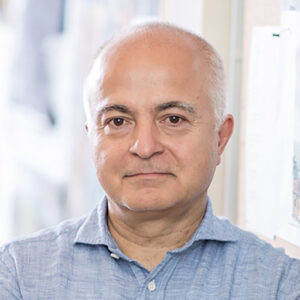 |
Yadegar Asisi is an internationally recognized artist and architect who is known for creating some of the largest 360° panoramas in the world, measuring up to 32 meters high and up to 110 meters in circumference. Asisi’s panoramic installations are known world-wide including prominent displays in Leipzig, Dresden, Berlin, Rouen, and New York. His current work includes a major commission concentrated on NEW YORK 9/11. Following his installations LEIPZIG 1813 and DRESDEN 1945, NEW YORK 9/11 is the third in Asisi’s series of anti-war projects, with a special focus on present-day conflicts. Asisi was invited by Professor of Art, Johannes DeYoung, to give a formal lecture to the Carnegie Mellon School of Art. |
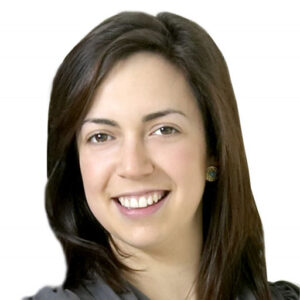 |
Dr. Manuella Blackburn is a specialist of fixed media within the field of electroacoustic sound – acoustic sound made for loudspeakers. She is currently a senior lecturer in Digital Media at Keele university, UK. Her work has extended to the realm of visual impetus for creativity, developing composition methods based on images. Her work has been performed in over 250 performances globally. Dr. Blackburn gave a lecture on her practice to the Experimental Sound Synthesis class taught by CMU Music Professor Annie Hui-Hsin Hsieh. |
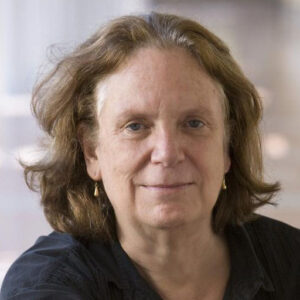 |
Anne Bogart is a prolific American theatre, opera, and film director. She is one of the Artistic Directors of SITI Company, which she founded with Japanese director Tadashi Suzuki in 1992, and head of the Graduate Directing Concentration at Columbia University. She is the author of five books of essays on theater making: “A Director Prepares, “And Then, You Act,” “Conversations with Anne,” “What’s the Story”, and, most recently, “The Art of Resonance.” She is also co-author, with Tina Landau, of “The Viewpoints Book,” a practical guide to Viewpoints training and devising techniques. Bogart’s influence has been felt throughout the contemporary theatre, through the widespread adoption of SITI’s training methods of Viewpoints and Suzuki and her oeuvre of over sixty groundbreaking original productions. Bogart’s influence has been felt throughout the contemporary theatre, through the widespread adoption of SITI’s training methods of Viewpoints and Suzuki and her oeuvre of over sixty groundbreaking original productions. Anne Bogart presented a discipline-specific discussion with MFA directing students in the John Wells Directing Fellowship followed by a public lecture in conjunction with workshops that were hosted on campus by other members of the SITI company while they are in town to perform at City Theatre. |
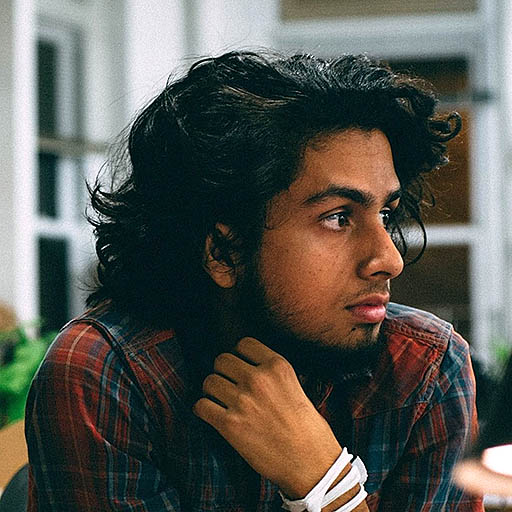 |
Gautam Bose is a creative technologist living in San Francisco, working at Google Creative Lab. He spends his time working to make machine learning more accessible, understandable, and useful for everyone. Along with Lucas Ochoa, Bose co-directed “A Tinkerer’s Guide to the AI Galaxy“, a workshop at the STUDIO in design prototyping with machine learning. |
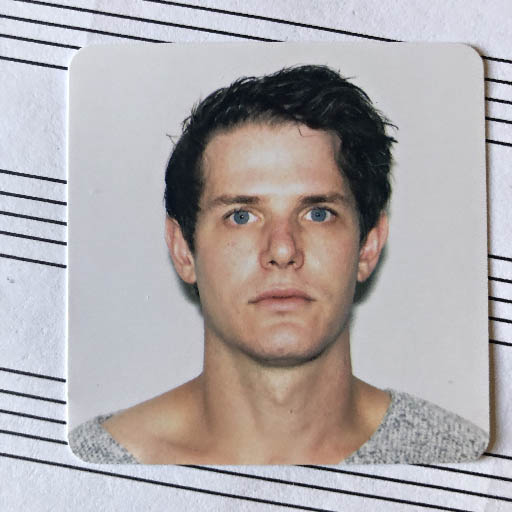 |
Peter Bradley is a conceptual artist, whose recent work is about computers and metaphysics. Applied first to music and the concept of keys, and now to language and the notion of semantic similarity, his practice aims to test the limits of computation, to capture the meaning of an idea as its being is reduced to quantity. He lives in New York City and tours as a member of Japanese Breakfast. Bradley presented as part of the STUDIO’s “Shall Make, Shall Be” artist lecture event. |
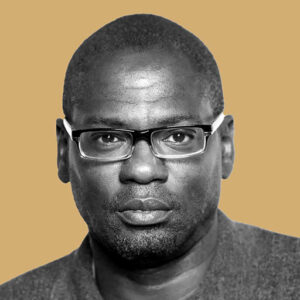 |
Briane Broome is a poet, memoirist and screenwriter. He was born in Oho and has lived most of his life in Pittsburgh, He was the K Leroy Irvis Fellow at University of Pittsburgh last year and taught in their creative writing program. He is the 2022 writer in residence at St Mary’s College, Moraga CA. His writing questions African American masculine identities and opens discussion on gender, addiction and the experience of racism. Brian Broome has been interviewed and invited onto several media platforms to discuss his debut memoir Punch Me Up to the Gods. Briane Broome was invited by Prof. of Architecture Mary-Lou Arscott to present his work to the SoArch advanced studios. Brian Broome’s memoir provides a clear opposition to the conventional histories of heroic industrial production. His visit in person builds on a series of conversations with black faculty; Alisha Wormsley, Jackie McFarland and Bill Bates. |
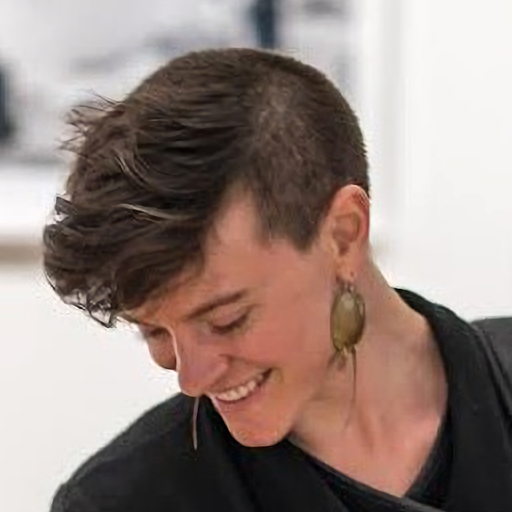 |
Danielle Isadora Butler designs experiences, installations, and objects that create new opportunities for emotional connection. She has designed and produced playgrounds that teach about cooperation, multi-sensory poetry archives that encourage deep listening, and large-scale games that connect participants to their locales. Her skills in human-centered design extend from a background that combines arts education, creative technology, and restorative justice. Butler believes that building relationships is the key to engaging people in issues that feel too large or abstract to comprehend. She is especially passionate about improving access to water and using creative interventions to deepen New Yorkers’ relationship to their harbors. She is co-founder of both the Tideland Institute and the Awesome On The Water organization, which support cultural initiatives on New York waters. Butler presented as part of the STUDIO’s “Shall Make, Shall Be” artist lecture event. |
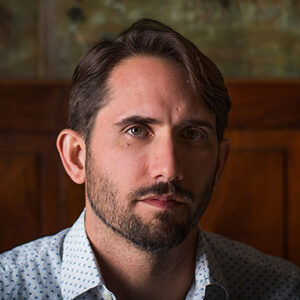 |
Bradley Cantrell is a landscape architect and scholar whose work focuses on the role of computation and media in environmental and ecological design. Cantrell was invited to present his work to Dana Cupkova’s “Introduction to Ecological Design and Thinking” class in the School of Architecture. |
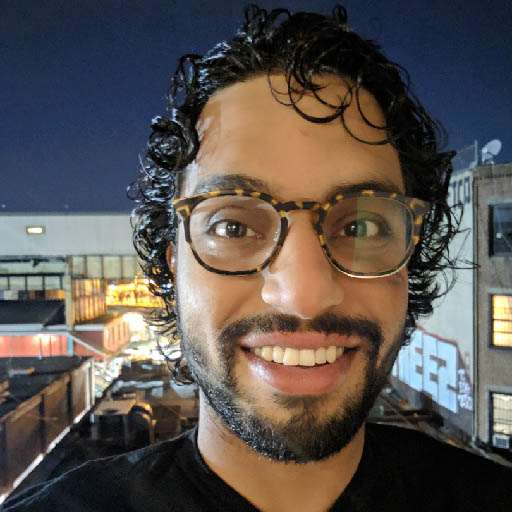 |
Arnab Chakravarty is a designer, technologist and educator with a background in building interfaces for communities overlooked by dominant technology platforms. Previously, he worked as an ethnographer and designer in several multinational organizations; at NYU ITP, his interests have focused on living with the things that he makes, creating immersive experiences for co-liberation, and discovering what makes people touch things. His work has been shown at venues including FAB:Learn, No:Quarter, Bengaluru MakerFaire, Kochi Biennale, and NYC Media Lab. As a member of the Broken Ghost Immersives collective, Chakravarty presented as part of the STUDIO’s “Shall Make, Shall Be” artist lecture event. |
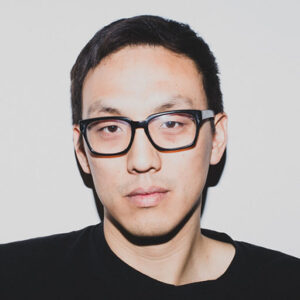 |
Ian Cheng explores the nature of mutation and the capacity of humans to relate to change. Drawing on principles of video game design, improvisation, and cognitive science, Cheng has produced a series of simulations exploring an agent’s capacity to deal with an ever-evolving environment. Most recently, he has developed BOB (Bag of Beliefs), an AI creature whose personality, body, and life story evolve across exhibitions, what Cheng calls “art with a nervous system.” He is an award-winning, interdisciplinary artist who exhibits internationally across numerous prestigious venues in the US, Switzerland, UK, Germany, Korea, China, Italy, et. al. Ian Cheng was invited by Prof. of Art Dr. Cash Ragona to visit their class “DeepFake: Posthumanism and Beyond.” |
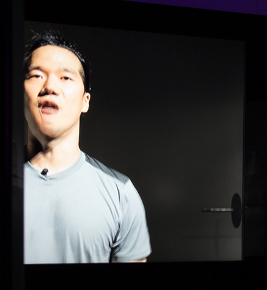 |
Jinseok Choi recent works investigates racial and institutional hierarchies in our everyday lives and how they perpetuate themselves by manipulating individuals via culture and politics. Choi creates and visualizes moments for the audience to acknowledge the violence embedded in our bodies and mindsets by collecting, presenting, editing, and manipulating quotes and images from various media. Jinseok graduated from Calarts and is currently running his own alternative gallery called MOTOR in Los Angeles, California. Choi has exhibited internationally at Human Resources LA, Florida State University Museum of the Arts, Other Place Art Fair, Cal State LA Fine Arts Gallery among others. At CMU, Choi was invited by School of Art MFA Candidate Catherine Yoo to speak to an informal affinity group of Korean Diaspora students at Carnegie Mellon. |
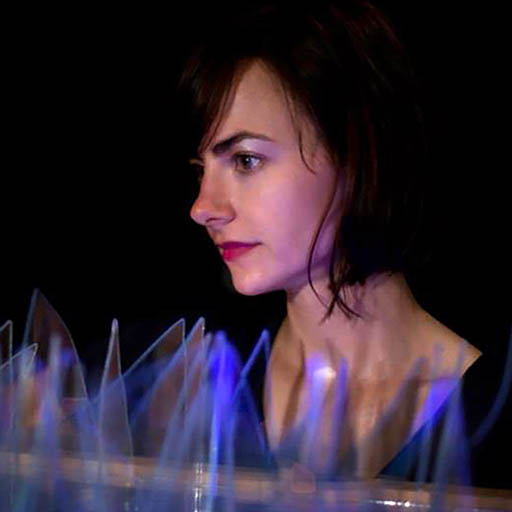 |
Melissa F. Clarke is a Brooklyn-based interdisciplinary artist whose work often employs generative and interactive custom-programmed environments. In her work, she extrapolates research into multimedia installations, generative environments, audiovisual sculptures, performances, and printed images. A graduate of NYU ITP, Clarke has taught media arts at SUNY Stony Brook, and has participated in residencies at Pioneer Works, the Simons Center for Geometry and Physics, and Visible Future Labs at SVA. As a member of the arts.codes collective, Clarke presented as part of the STUDIO’s “Shall Make, Shall Be” artist lecture event. |
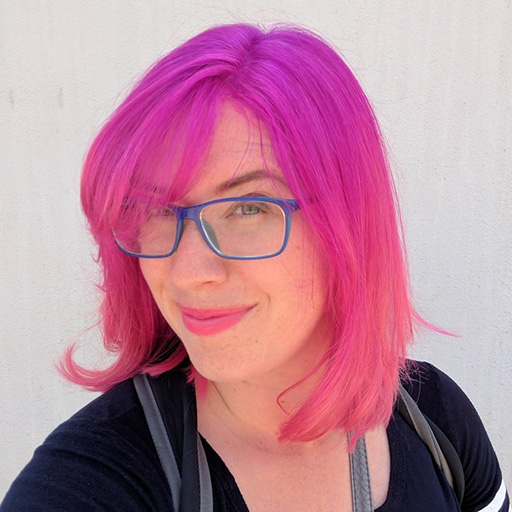 |
Kate Compton (@GalaxyKate) is a long-time generative artist, inventor, programmer and assistant professor of instruction at Northwestern University. She wrote the first paper on procedural platform-game levels, generated the planets for the video game Spore, created the language Tracery which runs over 10000 community-made bots on Twitter and invented an early phone-based AR system. Her mission is to design artificial intelligence to augment human creativity and to create tools that brings AI into the hands of poets, artists, kids and weirdos. At CMU, Compton visited the students of Prof. Golan Levin’s course, Interactivity and Computation. |
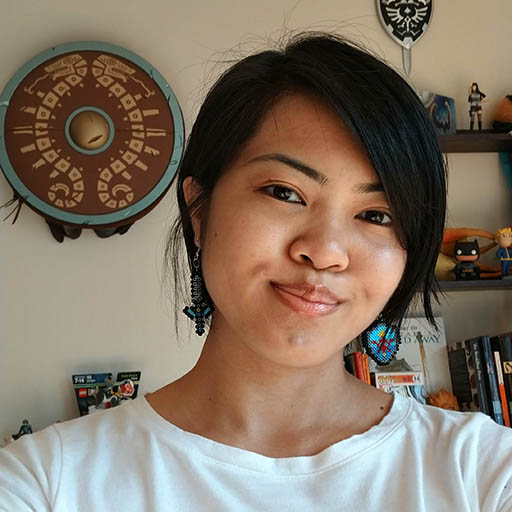 |
Cherisse Datu was raised on the island of Guam. A first-generation Filipino American, she was born to Kapangpangan parents who, despite not playing games themselves, fostered her love for them—perhaps because her Gameboy kept her quiet during long car rides. She is currently a video producer at Bethesda Softworks. She previously worked in video at ESPN’s The Undefeated and Al Jazeera’s The Stream. Datu received her Masters in Game Design and her Bachelor’s in Film and Media Arts from American University. A video producer with a background in broadcast news editing and digital entertainment, she finds comfort in creating small forms of playable art to help process current events. Datu presented as part of the STUDIO’s “Shall Make, Shall Be” artist lecture event. |
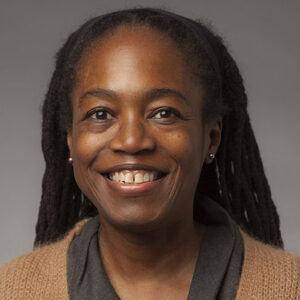 |
Felicia Davis works in architecture and textiles to connects art, science, engineering and design. She was recently featured by PBS in the “Women in Science Profiles” series. Davis is currently completing a book that examines the role of computational materials in our lives titled Softbuilt: Networked Architectural Textiles. Davis’ work is part of the Museum of Modern Art’s forthcoming exhibition Reconstruction: Blackness and Architecture in America. Davis presented her work to the students of “Introduction to Ecological Design and Thinking” taught by School of Architecture Professor Dana Cupkova. |
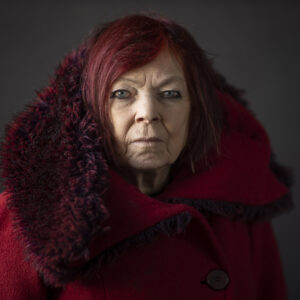 |
Kirsten Dehlholm is a performance artist and founder of the Danish production group “Hotel Pro Forma” (1985-present). Hotel Pro Forma is a production company of performances and exhibitions. Every production is a new experiment and contains a double staging: contents and space. The architecture and the traditions of the venue are part of the performance as a co-player. Perception, perspective and themes from the world today intertwine with each other in a conceptual, visual and musical work of art. Each production is the result of a close collaboration of professionals from many disciplines: the visual arts, architecture, music, film, literature, science, and digital media. At CMU, Dehlholm was invited by John Wells MFA Directing Faculty Ivan Talijancic to screen Hotel Pro Forma’s “WAR SUM UP” and participate in a live panel with the MFA directing fellows. |
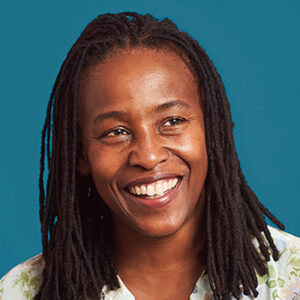 |
Stephanie Dinkins is a transmedia artist who creates experiences that spark dialog about race, gender, aging, and our future histories. Her work in AI and other mediums uses emerging technologies and social collaboration to work toward technological ecosystems based on care and social equity. Dinkins’ experiences with and explorations of artificial intelligence have led to a deep interest in how algorithmic systems impact communities of color in particular and all of our futures more generally. Stephanie Dinkins was invited by Professor of Design Christina Harrington to present her work to the students of the Equity and Health Innovations Design Research Lab. |
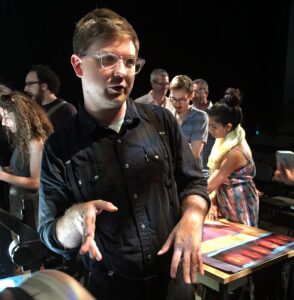 |
Drew Dir is the co-artistic director of the Chicago-based theater group, Manual Cinema. He is a writer, director, and puppet designer. Previously, he served as Resident Dramaturg of Court Theatre and as a lecturer in theater and performance studies at the University of Chicago. Dir holds a master’s degree in text and performance studies from King’s College London and the Royal Academy of Dramatic Art. At CMU, Dir was invited by the STUDIO, School of Art, and Kenner Global Classroom as a guest artist and lecturer for a three-day workshop with Eightfinity Studio and Wishnok Studios to guide students through puppet construction, analog projection design, and sound design. |
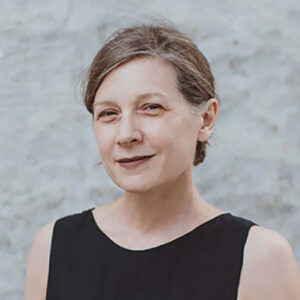 |
Keller Easterling is an architect, radical thinker, theorist and educator, based at Yale University’s School of Architecture. Keller has been developing design strategies to counter planetary violence. Her books Subtraction, ExtraStatecraft and Medium Design continue to shake the conventional ideas of professional architectural roles and point to fundamental misunderstanding of global and cultural operatives. Easterling was invited by Prof. of Architecture Mary-Lou Arscott to present to her advanced Synthesis Option Studio “CITY as FILM.” |
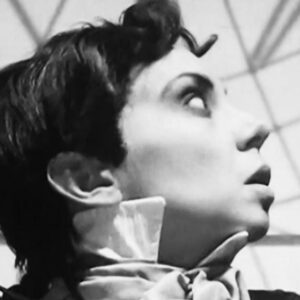 |
Sarah Fornace works as a Co-Artistic Director at Manual Cinema with Drew DIr. Sarah graduated from University of Toronto and is currently based in Chicago. At CMU, Fornace was invited by the STUDIO, School of Art, and Kenner Global Classroom as a guest artist and lecturer for a three-day workshop with Eightfinity Studio and Wishnok Studios to guide students through puppet construction, analog projection design, and sound design. |
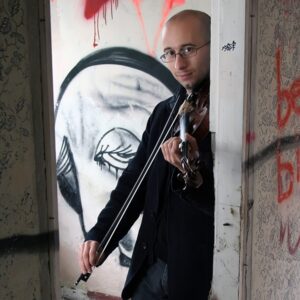 |
Marco Fusi is a violinist/violist, and a passionate advocate for the music of our time. Marco also plays viola d’amore, commissioning new pieces and collaborating with composers to promote and expand existing repertoire for the instrument. A strong advocate and educator of contemporary music, he lectures and workshops at Columbia University, University of California – Berkeley, Basel Musikhochschule, New York University, Boston University, Royal Danish Academy of Music – Copenhagen, Cité de la Musique et de la Danse – Strasbourg, University of Chicago.Marco teaches Contemporary Chamber Music at the Milano conservatory “G. Verdi” and is Researcher in Performance at the Royal Conservatoire of Antwerp. Marco Fusi was invited by Prof. of Music Annie Hui-Hsin Hsieh to engage with students through the recording and rehearsal of “Breathless” a new electroacoustic piece written for the viola d’amore. |
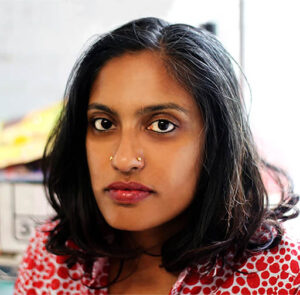 |
Chitra Ganesh is a visual artist based in Brooklyn, New York. Ganesh’s work across media includes: charcoal drawings, digital collages, films, web projects, photographs, and wall murals. Ganesh draws from mythology, literature, and popular culture to reveal feminist and queer narratives from the past and to imagine new visions of the future. At CMU, Chitra Ganesh was invited by Julie Hakim Azzam to facilitate a guest critique and an intimate conversation with the School of Art MFA Cohort. |
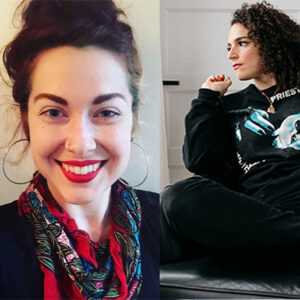 |
Hacking/Hustling is a collective of sex workers, survivors, and accomplices working at the intersection of tech and social justice to interrupt state surveillance and violence facilitated by technology. We come from backgrounds of sex work, public health, data science, community organizing, created in response to the threat of FOSTA-SESTA We create educational programming for sex workers, best practice trainings for healthcare providers and people developing technology and legislation, as well as programming that bridges the gap between these often dissonant communities. Hacking/Hustling was invited by then MFA Candidate Lena Chen to facilitate a panel with Veil Machine Collective on cybersecurity and deplatforming. |
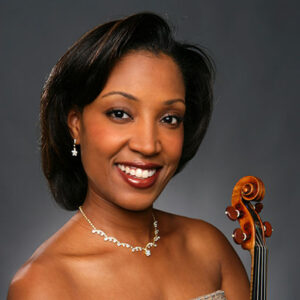 |
Kelly Hall-Tompkins is a violin soloist entrepreneur who has been acclaimed by the New York Times as “the versatile violinist who makes the music come alive,” for her “tonal mastery” (BBC Music Magazine) and as New York Times “New Yorker of the Year.” As founder of Music Kitchen-Food for the Soul, Kelly Hall-Tompkins is a pioneer of social justice in classical music, bringing top artists in over 100 concerts in homeless shelters coast to coast from New York to Los Angeles, and in internationally in Paris, France. Music Kitchen commissioned and will present the World Premiere of the Forgotten Voices Song Cycle in Association with Carnegie Hall. Monique Mead, Director of Music Entrepreneurship in CMU’s School of Music, invited Kelly Hall-Tompkins to engage with students as an example of developing their professional presence across multiple skillsets. |
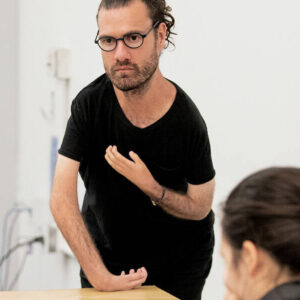 |
Joshua Halstead is an epistemic activist working at the intersection of critical disability studies, design pedagogy, and community organizing. A recognized contributor to disability design discourse, they seek to unsettle and rupture normative systems of thought by centering marginalized perspectives. Halstead has been an invited lecturer in academic and industry settings—from Stanford to Google—and is co-author of the book “Extra Bold: A Feminist, Inclusive, Anti-Racist, Non-Binary Field Guide for Graphic Designers.” Their current project, Cripjoy, is a transnational, majority-BIPOC community of practice focused on reworlding mental health through an intersectional, anti-ableist, and anti-sanist lens. At CMU, Halstead was invited by School of Design PhD Candidate Esther Kang to speak to the students of her “Cultures” class. |
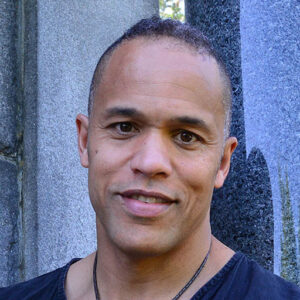 |
Keith Hamilton Cobb is the writer and performer of AMERICAN MOOR (published by Bloomsbury/Methuen). An actor drawn mostly to the stage in his working life, he is also recognized for several unique character portrayals he has created for television. He is a graduate of NYU’s Tisch School of the Arts with a BFA in acting. He created the role of Noah Keefer for the ABC daytime drama, “All My Children,” for which he garnered a Daytime Emmy Award nomination; the role of Tyr Anasazi for Gene Rodenberry’s “Andromeda,” the role of Damon Porter for the CBS daytime drama, “The Young and the Restless,” and the role of Quincy Abrams for the Logo Network series, “Noah’s Arc.” Keith Hamilton Cobb was invited to speak to the Drama students by Kim Weild, Option Coordinator for the John Wells Directing Fellowship at CMU’s School of Drama. Coinciding with his staging of AMERICAN MOOR at the Pittsburgh Playhouse, Keith’s guest lecture discussed Shakespeare, Race, America, and the state of American Theater. |
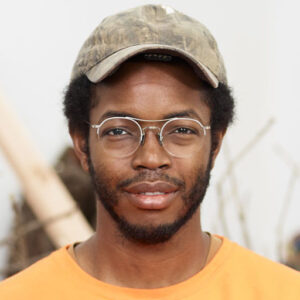 |
Hugh Hayden considers the anthropomorphization of the natural world as a visceral lens for exploring the human condition. Hayden transforms familiar objects through a process of selection, carving and juxtaposition to challenge our perceptions of ourselves, others and the environment. Raised in Texas and trained as an architect, his work arises from a deep connection to nature and its organic materials. Hayden utilizes wood as his primary medium, frequently loaded with multi-layered histories in their origin, including discarded trunks, rare indigenous timbers, Christmas trees and souvenir African sculptures. He creates new composite forms that also reflect their complex cultural backgrounds. Hayden presented a formal lecture on his process to the students of 3D Media I taught by Prof. of Art Isla Hansen. |
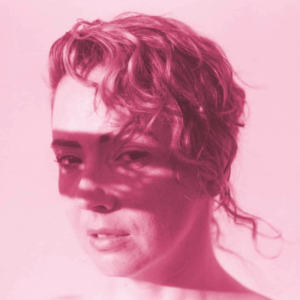 |
Lauren Sarah Hayes is a Scottish improviser and sound artist. Her music is a mix of experimental pop/live electronics/techno/noise/free improvisation and has been described as ‘voracious’ and ‘exhilarating’. She is a sculptress of sound, manipulating, remixing, and bending voice, drum machines, analogue synths and self-built software live and physically. She is excited by what can happen in the vulnerable relationships between sound, space, and audience. Her shows are highly physical, making the performance of live electronic music more engaging for audiences. Over the last decade she has developed and honed a deliberately challenging and unpredictable performance system that explores the relationships between bodies, sound, environments, and technology. At CMU, Hayes was invited by School of Music Professor Freida Abtan to speak to the Electronic Music Majors. |
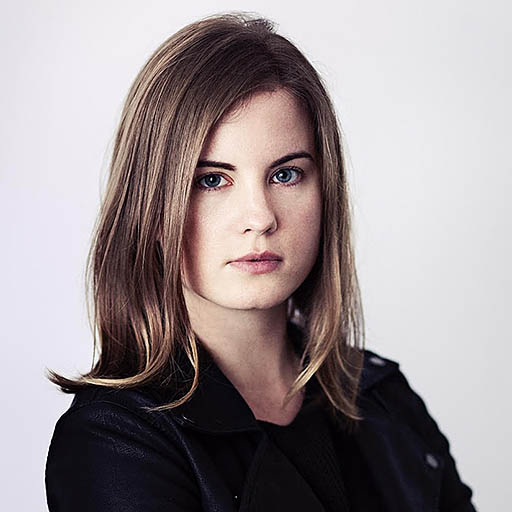 |
Lindsay Howard is an American curator, writer, and new media scholar whose work explores how the internet is shaping art and culture. Her exhibitions focus on social dynamics and aesthetics within online communities, as well as transparency, hacktivism, and collaborations between artists and technologists. Howard has spent the last decade organizing projects with the New Museum, Museum of the Moving Image, Kickstarter, Eyebeam Art and Technology Center, and Gray Area Foundation for the Arts. She has written and spoken extensively about digital art and new approaches to valuation, and serves on the board of Rhizome, an organization that champions born-digital art and culture. In 2021, Fortune recognized her as one of the top 50 influencers in the NFT space. Presently Howard is the Head of Community at Foundation; in this role, she has personally overseen over 20 million dollars worth of NFT sales and helped to set record prices for a number of leading creators. At CMU, Howard spoke with classrooms led by School of Art professors Golan Levin and Elizabeth Chodos. |
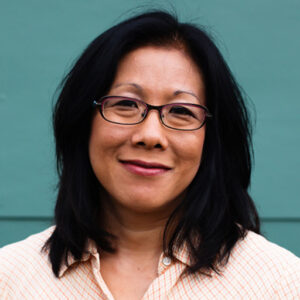 |
Mizuko (Mimi) Ito is a cultural anthropologist of technology use, examining children and youth’s changing relationships to media and communications and is Professor in Residence and John D. and Catherine T. MacArthur Foundation Chair in Digital Media and Learning at the University of California, Irvine, with appointments in the University of California Humanities Research Institute, the Department of Anthropology, and the Department of Informatics. Mimi Ito was invited by Prof. of Art Isla Hansen to give a lecture entitled “Engineering Play: Designing at the Crossroads of Education and Entertainment.” |
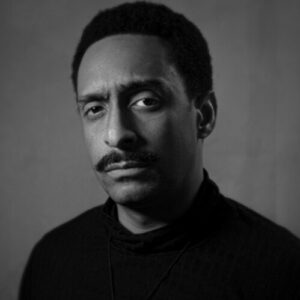 |
Rasean Davonté Johnson is a video artist and designer of projections, scenery, and sound for theatre, film, and installations. Based in Chicago, his practice eightinfinitystudio specializes in design, video engineering, consultation, and content creation for the performing arts. He received his MFA from the Yale School of Drama in Design and has lectured at Yale University, Columbia College Chicago, Syracuse University, Boston University, The Theatre School at Depaul, and the Ohio State University. At CMU, Johnson was invited by the STUDIO, School of Art, and Kenner Global Classroom as a guest artist and lecturer for a three-day workshop with Manual Cinema and Wishnok Studios to guide students through puppet construction, analog projection design, and sound design. |
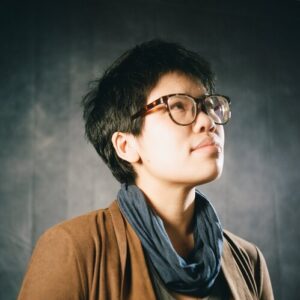 |
Pornchanok (Nok) Kanchanabanca is is a Thai artist, sound designer, musician and composer. Nok has worked with theatre companies across the United States including Lincoln Center, Rattlestick, Geva Theatre and Milwaukee Repertory Theater, among many others. She has also collaborated with performing groups and theatre companies in Thailand including B-Floor Theatre, Babymime, Crescent Moon and Democrazy Theatre Studio since 2008. Nok graduated from the Yale School of Drama and is a member of the Theatrical Sound Designers and Composers Associate (TSDCA). At CMU, Nok was invited by the STUDIO, School of Art, and Kenner Global Classroom as a guest artist and lecturer for a three-day workshop with Manual Cinema and Eightfinity Studio to guide students through puppet construction, analog projection design, and sound design. |
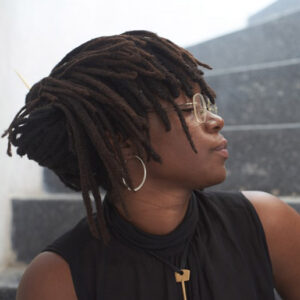 |
Bleue Liverpool is a Caribbean-American interdisciplinary artist who uses video, analog film/photography, text and new media techniques to illustrate what she calls diagrammatic equations. Her practice pivots at exploring the convergence of intimate and socio-political experiences of non-western, female-identified Diaspora within port city culture. Initially trained as a documentary filmmaker, she has expanded her practice to produce experimental video essays and multimedia sculptural installations. Her work is informed by Third World Feminist discourse, Afro-Surrealism, Négritude Movement, Fluxus, and the axioms of Euclidean geometry. Liverpool is also part of the audiovisual collective A/B ALTER with the South Korean-Canadian musician Andrew Yong Hoon Lee. She has exhibited both nationally and internationally at Artist Space (NYC), Tanz Im August (Berlin), New Museum (NYC) amongst others. She attended Brooklyn College for Documentary Film Production, was a Mary Ellen Mark Memorial Scholar 18’ at The International Center of Photography and is currently a MFA 22’ candidate at Bard College. Liverpool lives and works between Brooklyn, NYC and Montréal, QC. |
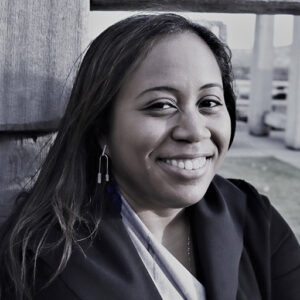 |
Mae-ling Lokko is an architectural scientist, designer, and educator from Ghana and the Philippines whose work centers on the upcycling of agrowaste and biopolymer materials. Lokko holds a Ph.D. and Masters of Science in Architectural Science from the Center from Architecture, Science and Ecology, Rensselaer Polytechnic Institute and B.A from Tufts University. Her research integrates a broad range of technical, environmental, social and cultural criteria that questions contemporary material-value systems, codevelops business models for upcycling between the Global North and South and evolves material design criteria to meet generative justice goals. Mae-Ling Lokko was invited by Prof. of Architecture Dana Cupkova to visit the students of her “Introduction to Ecological Design and Thinking” course. |
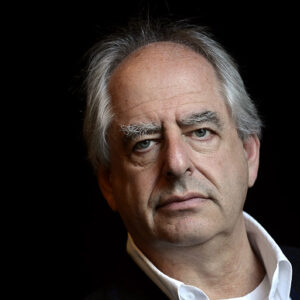 |
William Kentridge is internationally acclaimed for his drawings, films, theatre and opera productions. His method combines drawing, writing, film, performance, music, theatre, and collaborative practices to create works of art that are grounded in politics, science, literature and history, yet maintaining a space for contradiction and uncertainty. Kentridge’s theatrical productions, performed in theatres and at festivals across the globe include Refuse the Hour, Winterreise, Paper Music, The Head & the Load and in collaboration with the Handspring Puppet Company, Ubu & the Truth Commission, Faustus in Africa!, Il Ritorno d’Ulisse, and Woyzeck on the Highveld. Kentridge was invited by Special Visiting Faculty in the School of Drama, Ivan Talijencic, to screen his 2018 work “The Head & the Load” in the STUDIO for Creative Inquiry. |
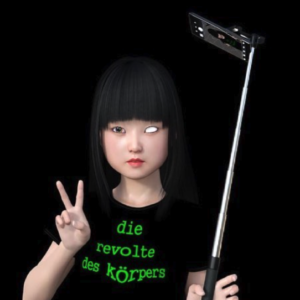 |
Wednesday Kim is an interdisciplinary artist and a co-founder of De:Formal Online Gallery, one of the top emerging artist online galleries focusing on digital art and sculpture. She is from Seoul, South Korea and is currently based out of California. Kim works with a mixture of analog and digital media including 3D animation, video, performance, installation, print, and sculpture with clusterfuck Aesthetic. Her work is informed by personal experiences and human psychology; she derives imagery from nightmares, intrusive thoughts, and childhood trauma. Furthermore, she portrays the absurdity of information-saturated contemporary life in a surrealist fashion through wordplay, Wikipedia, voyeurism, and witticism. At CMU, Kim was invited by MFA Candidate Catherine Yoo to an informal affinity group fo Korean Diaspora students at Carnegie Mellon. |
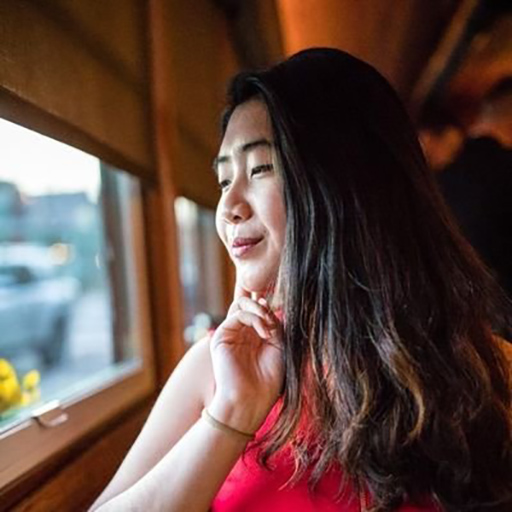 |
MeeNa Ko (Moaw!) is a video game developer specializing in pixel art. They work to build creative communities through game development, bridging dialogues between STEM and art, and have worked professionally with many companies to make games and pixel-art advertisements. Outside of commercial work, they design open-source game development assets and engage in accessible education initiatives such as workshops and events through RVA Game Jams and Tutorial Stage. More recently, they were working as a remote-education consultant for CodeVA. Alongside Broken Ghost Immersives, Moaw! presented as part of the STUDIO’s “Shall Make, Shall Be” artist lecture event. |
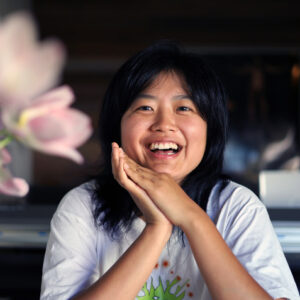 |
Heesoo Kwon is a visual artist and anthropologist from South Korea currently based in the Bay Area, California. In 2017, Kwon initiated an autobiographical feminist religion Leymusoom, as an ever-evolving exploration of her family histories and feminist liberation. At CMU, Kwon was invited by MFA Candidate Catherine Yoo to an informal affinity group fo Korean Diaspora students at Carnegie Mellon. |
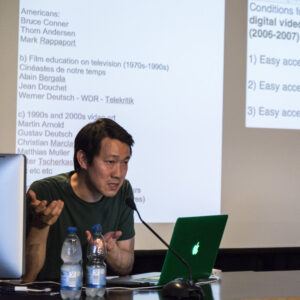 |
Kevin B Lee is a filmmaker, media artist, and critic. He has produced over 360 video essays exploring film and media. He was Founding Editor and Chief Video Essayist at Fandor from 2011-2016, supervising producer at Roger Ebert Presents At the Movies, and has written for The New York Times, Sight & Sound, Slate and Indiewire. He is Professor of Crossmedia Publishing at Merz Akademie, Stuttgart. At CMU, Lee was invited by MFA Candidate Anisha Baid to speak to the First-Year MFA Cohort at the School of Art. |
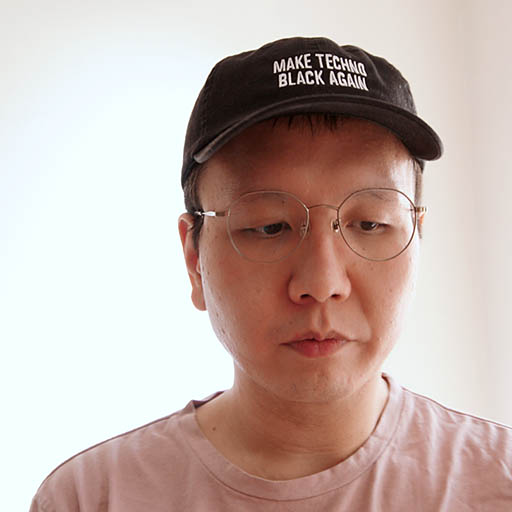 |
Ryan Kuo creates works that are process-based, diagrammatic, and caught in a state of argument. He uses video games, productivity software, web design, and text to produce circuitous and unresolved movements that track the passage of objects through white escape routes. He holds a Master of Science in Art, Culture and Technology from MIT, and has held residencies at Pioneer Works and the Queens Museum Studio Program. Kuo’s works have been shown in venues such as the Whitney Museum of American Art, Queens Museum, TRANSFER, and bitforms gallery, and are distributed online at left gallery. His recent and forthcoming projects include File: A User’s Manual, an artist’s book about aspirational workflows modeled after software guides for power users; and Faith, a conversational AI agent that zealously embodies the blind “faith” underpinning both white supremacy and miserable white liberalism. Kuo presented as part of the STUDIO’s “Shall Make, Shall Be” artist lecture event. |
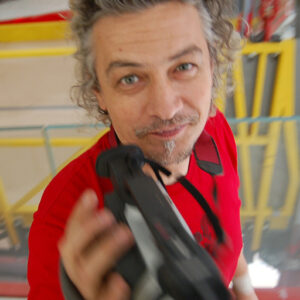 |
Chico MacMurtrie has explored the intersection of robotic sculpture, new media installation, and performance since the late 1980s. MacMurtrie’s work investigates organic life from deep within, finding geometry in all living systems. MacMurtrie and his interdisciplinary collective “Amorphic Robot Works” (ARW) have received numerous awards for their experimental new media artworks, including five grants from the National Endowment for the Arts, the Andy Warhol Foundation Grant, the Rockefeller Foundation Fellowship, VIDA Life 11.0, and Prix Ars Electronica. Chico MacMurtrie was awarded the Guggenheim Fellowship in Fine Arts in 2016 and the Map Fund Grant in 2019. MacMurtrie was invited to CMU by Prof. Olivia Robinson to present an overview of his past and current work to students in CMU IDeATe’s Kinetic Fabrics and Inflatables courses. |
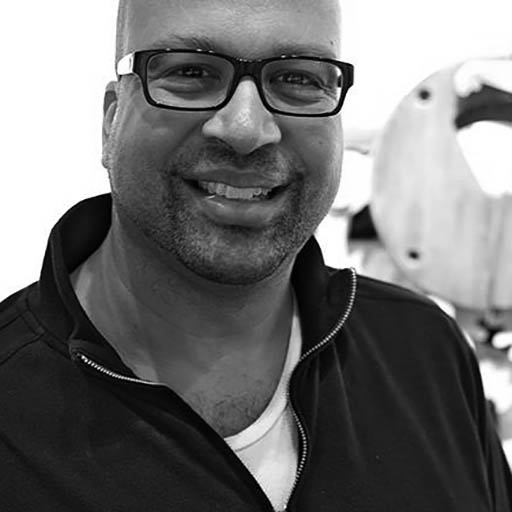 |
Andy Malone holds a Bachelor of Architecture degree from the University of Detroit Mercy, and has worked in the exhibit design and custom furniture industry for over 25 years. Notable clients include Google, Twitch, Konami, Salesforce, Dolby, LG, Dodge, HP, T-Mobile, and Bethesda Games. His playable sculptures and games have been shown in over 75 exhibitions since 1995, including two recent solo exhibitions: Play Room (2017) and Happy Accidents (2019). As a curator of game arts, Malone co-organized Game Show Detroit (2006) at the Contemporary Art Institute of Detroit and Game Show NYC (2011) at Columbia University. Malone also curated the Bravo! Bravo! Art Exhibition at the Detroit Opera House in 2004 and 2005. Malone currently serves as Vice President of HATCH, an interdisciplinary arts center in Hamtramck, Michigan. Malone presented as part of the STUDIO’s “Shall Make, Shall Be” artist lecture event. |
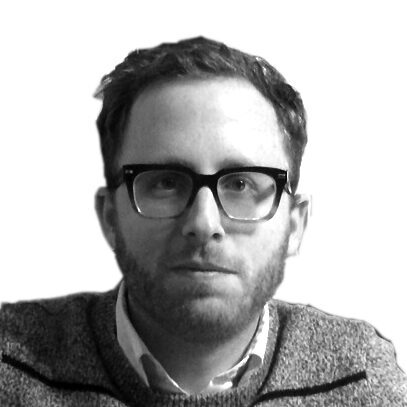 |
Adam Marcus directs Variable Projects, a design and research studio that operates at the intersection of architecture, computation, and fabrication. He is also a partner in Futures North, a public art collaborative dedicated to exploring the aesthetics of data. His work explores ways in which new technologies can interface with longstanding architectural traditions of craft, materiality, ornament, and pattern. He is a founding partner of Architectural Ecologies Lab, a designer of Buoyant Ecologies Float Lab, a prototype for a floating breakwater. Adam Marcus was invited by Professor of Architecture Dana Cupkova to give a lecture to students of her “Introduction to Ecological Design and Thinking,” course. |
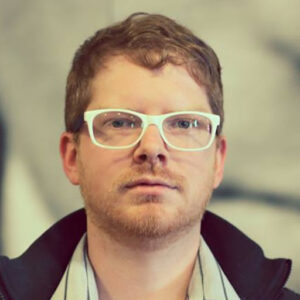 |
James McAnally is a curator, critic and editor whose disparate work proposes prefigurative institutional practices, the critic-as-strategist, and publishing as processional protest. He is a co-founder and Executive Director of The Luminary, an expansive platform for art, thought, and action based in St. Louis, MO. McAnally also serves as the editor and co-founder of MARCH: a journal of art & strategy, was the editor and co-founder of Temporary Art Review, a platform for contemporary art criticism. Ian was invited by Instructor of Art Dana Bishop-Root to speak to the students of Contextual Practice Seminar. |
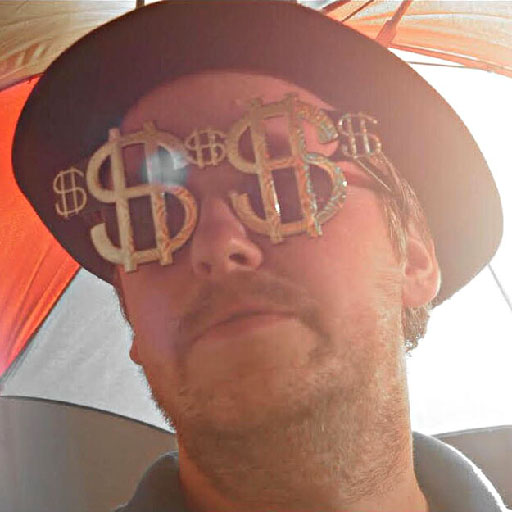 |
Ian McNeely holds an MFA in Theater Arts from Brown University, where he wrote and produced a series of original rock operas. McNeely was awarded the Oregon Shakespeare Festival’s 2009 Rex Rabold Fellowship and delivered the keynote speech at their annual HIV/AIDS fundraiser The Daedalus Project. He is the founder and artistic director of Broken Ghost Immersives, which produces theatrical events inspired by games. As a member of the Broken Ghost Immersives collective, McNeely presented as part of the STUDIO’s “Shall Make, Shall Be” artist lecture event. |
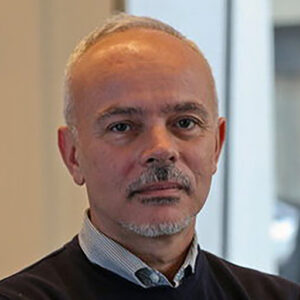 |
Brian McGrath is the founder and principal of Urban-Interface, LLC, and Professor of Architecture and Urban Design at The New School. His work and research fuses architecture, ecology, cinematography, and digital technology in the exploration of multisystemic multiscale urban ecological transformations. McGrath served as a Fulbright Senior Scholar in Thailand in 1998-99, an India China Institute Fellow in 2006-2008, Research Director in the joint US-EU exchange program Urbanisms of Inclusion, and Graham Foundation Awardee (2019). Brian McGrath was invited by Prof. of Architecture Tommy Yang to visit his Urban traces seminar and facilitate a weekend workshop, open to selected students from the department. McGrath and Yang explored technical tools in big data, mapping, cinematography, and modeling with students to co-create a weekend exploration in spatial ethnography and design as a tool for activism. |
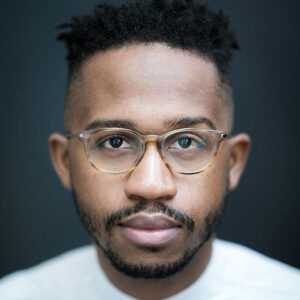 |
Kameron Neal is a video artist, performance-maker, and multidisciplinary designer based in NYC. Forbes described Kameron’s solo exhibition at Detroit Art Week 2019 as “an absurd escape that simultaneously provokes and entertains.” Kameron is currently a NYSCA/NYFA Fellow in Digital/Electronic Arts and has been in residence at CultureHub, The Public Theater’s Devised Theater Working Group, and forthcoming at Bemis Center. As a resident artist at Ars Nova, he co-created MukhAgni, an irreverent multimedia performance memoir, with Shayok Misha Chowdhury; the piece was curated in Under the Radar 2020. Kameron’s stop-motion self-portrait Liquid Love was awarded Best of Show at Digital Graffiti Festival 2017 where he returned in 2018 as an artist in residence to present a multichannel projection-mapped installation titled, Groundwater Vol. I & II. His video art has been featured in music videos and performances by Billy Porter and Rufus Wainwright. Kameron’s work has also been seen in The New York Times, Wall Street Journal, National Geographic, HYPEBEAST, Studio Magazine, and at BAM, New York Theatre Workshop, SohoRep, Bushwick Starr, La MaMa, New Orleans Film Festival, the Democratic National Convention, Vox Populi, and the Williams College Museum of Art. Kameron was invited by Professor of Drama Nica Ross to facilitate a workshop based on methodology for media creation. |
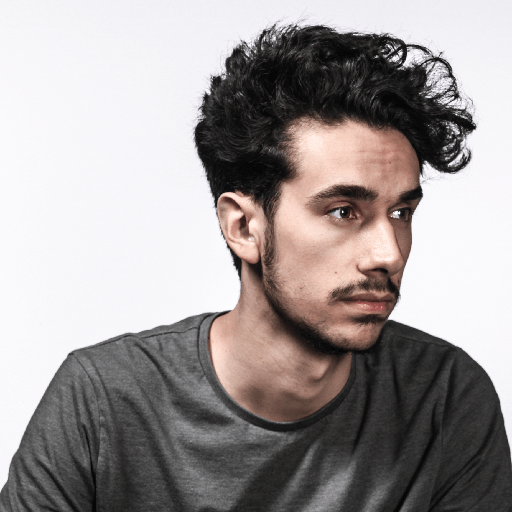 |
Lucas Ochoa is a human-robot interaction product manager and designer at Google X’s “Everyday Robot Project.” In his time at Google, he has worked as a creative technologist at the Creative Lab, and as a lead hardware interaction designer at Google hardware on the wearables team. He currently lives in San Francisco and often likes to stay home with a really good book. Along with Gautam Bose, Ochoa co-directed “A Tinkerer’s Guide to the AI Galaxy“, a workshop at the STUDIO in design prototyping with machine learning. |
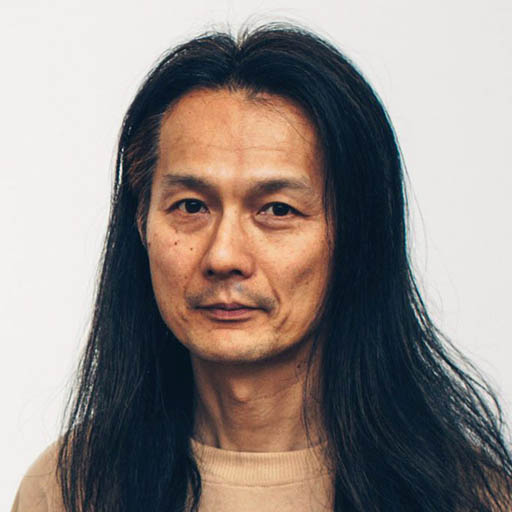 |
Aki Onda is an artist and composer. His works are often catalyzed by and structured around memories—personal, collective, historical—such as his widely-known project, Cassette Memories (2004–ongoing), drawn from three decades of field recordings. Crossing genres, he has been active internationally in art, film, music and performance. His artistic collaborators include Michael Snow, Ken Jacobs, Loren Connors, David Toop and Akio Suzuki. Onda presented a a special hybrid lecture titled “Unusual Transmissions” in which he played audio and video of his work and including ‘Nam June’s Spirit Was Speaking to Me’—an exploration of the mythic use of radio, his mass re-performances of Filipino composer and ethnomusicologist Jose Maceda’s works, and his 30+ year practice of documenting the world, its sounds, and his memories through a portable cassette recorder. Onda spoke about his manipulation of physical technologies such as radio waves, magnetic tape, and film as a means of transforming perception. |
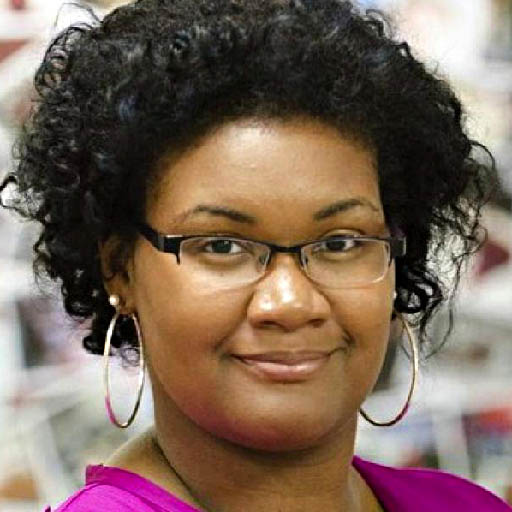 |
Latoya Peterson lives at the intersection of emerging technology and culture. She is currently cofounder and CXO at Glow Up Games, a game studio working on their first title set in the world of HBO’s Insecure. Previously, she was the Deputy Editor, Digital Innovation for ESPN’s The Undefeated, an Editor-at-Large at Fusion, and the Senior Digital Producer for The Stream, a social media driven news show on Al Jazeera America. In 2018, she soft launched AI in the Trap, a collaborative art project that explores the future of artificial intelligence and predictive policing through a hip-hop lens. In 2016, she produced a critically acclaimed YouTube series on Girl Gamers that was highlighted on Spotify. She is currently on the advisory board of the Data & Society Institute and the board of visitors for The John S. Knight Journalism Fellowships. She is a US-Japan Leadership Foundation Fellow and a USC Civic Media Senior Fellow. She is also part of the selection committee for the Museum of Play’s World Video Game Hall of Fame. Peterson presented as part of the STUDIO’s “Shall Make, Shall Be” artist lecture event. |
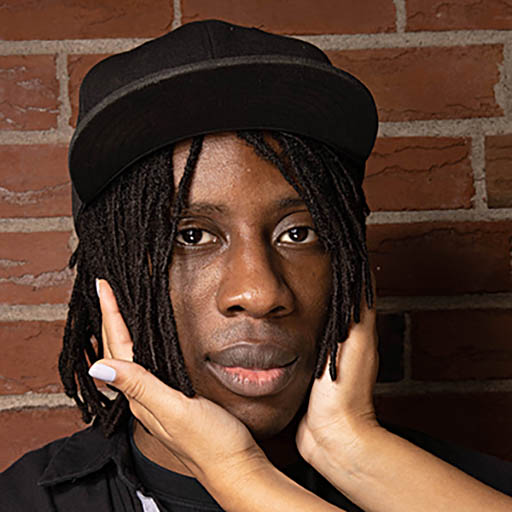 |
Shawn Pierre is a Visiting Assistant Arts Professor at the NYU Game Center and game designer working to combine new forms of play with different types of media. His work includes voice-controlled adventure games, social deduction SMS games, and physical games where players capture others in nets. In the past, Shawn has created and worked on crowd-based interactive activities, including installments at Graceland, as well as games for major sporting events. As a member and Project Director of Philly Game Mechanics, Shawn works to build a community where local creators meet new people and share their creative work. Pierre presented as part of the STUDIO’s “Shall Make, Shall Be” artist lecture event. |
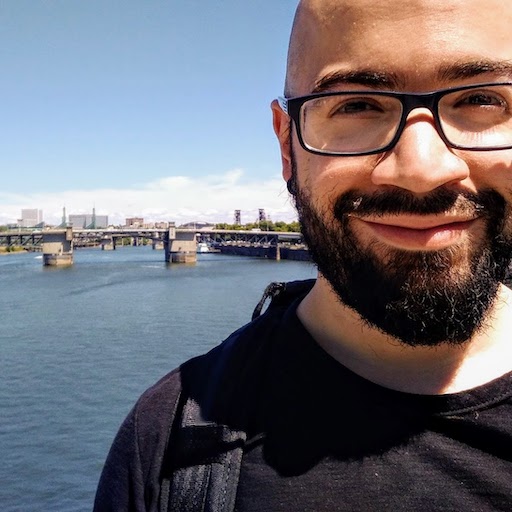 |
Oz Ramos (@midiblocks) is a creative technologist on a mission to bridge together the assistive tech and creative tech communities through the development of Handsfree.js, a library and set of tools for working with hand and face tracking in the browser. Oz was inspired to begin working on what became Handsfree.js in 2018 while he was homeless after meeting another resident at the shelter who was there recovering from a severe stroke that left him unable to communicate their remote with friends and family. Oz’s commitment to the project stems from his belief that by onboarding millions of new people into the arts and tech, humanity will accelerate into the future a little bit faster. Ramos shared his words and work with the students of Prof. Golan Levin’s course, Interactivity and Computation. |
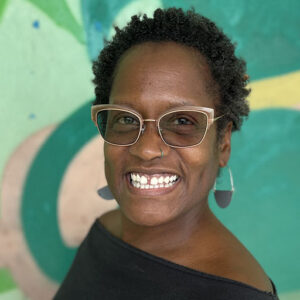 |
Felicia Savage Friedman has transformed lives with embodied antiracist organizing through Raja Yoga. Standing firm on the belief that we are all bound and dehumanized by systems of oppression, she envisions a humankind where we have dismantled these systems of oppression and humanely rebuilt new systems together. Felicia facilitated a mindfulness workshop following a reading of a performance text in the Frank-Ratchye Studio for Creative Inquiry. |
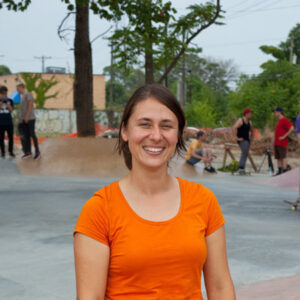 |
Gina Reichert is an artist, architect, and community developer. Her practice is rooted in developing strategies and self-initiated projects in her immediate Detroit neighborhood, defining opportunity in overlooked spaces and using the resources at hand. She is the co-founder of Power House Productions (PHP), an artist-run neighborhood-based nonprofit organization. Through a network of project houses, art installations, and dynamic programs, PHP integrates contemporary art and artistic practices into the daily life of our diverse Detroit neighborhood, creating public spaces for the exchange of ideas, opinions and experiences. Reichert conducted a virtual visit with the students of Commoning the City studio to provide an alternative mode of engagement. |
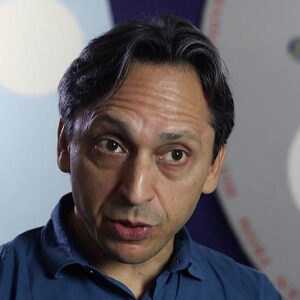 |
Roee Rosen is an Israeli multidisciplinary artist, writer and filmmaker. He is a professor at HaMidrasha – Faculty of the Arts, Beit Berl College in Kfar-Saba and at the Bezalel Academy of Arts and Design in Jerusalem. His work has been described by Hila Peleg for Documenta 14 as creating ” … an artistic universe that treacherously undermines the normative implications of identities and identifications through fictionalization, irony, and revision. In untold variations, he typically links current Israeli and world politics with mythical and political references to European and Jewish history. Using a vast array of fictional characters and iconographic motifs and codes, Rosen frequently refers to, and transforms, not only the canon of the historical avant-garde and transgressive traditions from the Marquis de Sade to Georges Bataille, but also popular media, political propaganda, and classic children’s fairy tales. Rosen was invited by the 1st and 2nd year MFA Cohorts from the School of Art for a guided virtual discussion of his work. |
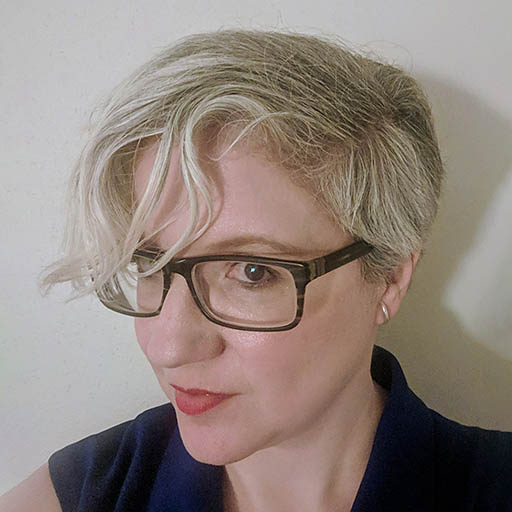 |
Margaret Schedel transcends the boundaries of disparate fields to produce integrated work at the nexus of computation and the arts. With an interdisciplinary career blending classical training in cello and composition, digital audio research, and computational arts education, she is internationally recognized for the creation and performance of ferociously interactive media. Her research in the sonification of gesture and data takes form in interactive opera, VR, and video games. Schedel is professor and co-director of computer music at SUNY Stony Brook. As a member of the arts.codes collective, Schedel presented as part of the STUDIO’s “Shall Make, Shall Be” artist lecture event. |
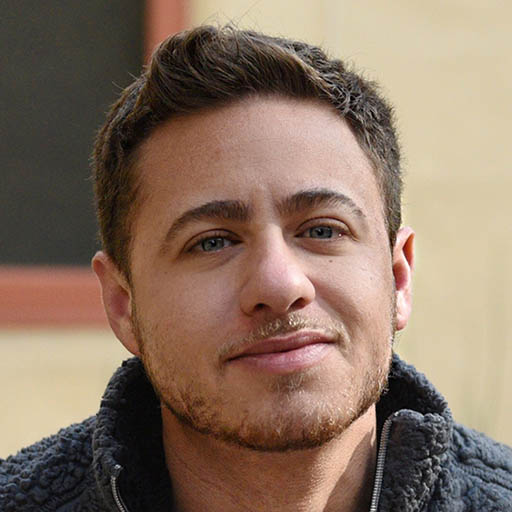 |
Alex Schmider is the producer of the documentary “Changing the Game” (2019) as well as the Director of Transgender Representation at GLAAD, the Associate Producer of the Netflix Original Documentary DISCLOSURE (2020) in which he co-authored the accompanying Toolkit for Entertainment Industry Professionals, and Executive Producer of the experimental documentary FRAMING AGNES (Sundance 2022). Schmider spoke with the students of Professor Angela Washko’s “Open Electronic Time-Based Art” class following a screening of “Changing the Game” in the STUDIO. |
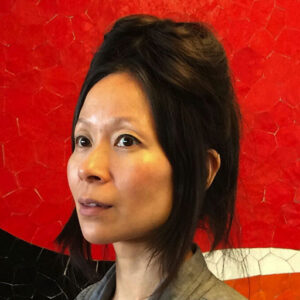 |
Astria Suparak is an artist, writer, and curator based in Oakland, California. Her cross-disciplinary projects address complex and thorny issues (like white supremacy, colonialism, and racial capitalism) made accessible through a popular culture lens (such as sci-fi movies, rock music, and sports). Straddling creative and scholarly work, the projects often take the form of publicly available tools, databases, and histories of subcultures and omitted perspectives. Astria Suparak was invited by Prof. of Art Alisha Wormsley to present her curatorial and scholarly work, “Asian Futures/Without Asians.” |
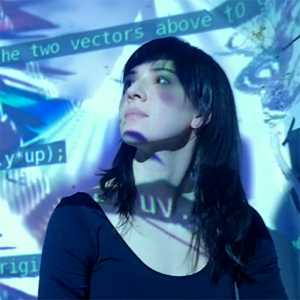 |
Char Stiles is a multidisciplinary digital artist. She works using emerging technologies as tools for expression. Using computational systems and algorithms she is producing pieces that span disciplines such as video, dance, interactive installation, performance and online works. She graduated from Carnegie Mellon University with a Bachelor of Computer Science and Fine Art and a minor in media design. At CMU, Stiles visited the students of Prof. Golan Levin’s course, Interactivity and Computation. |
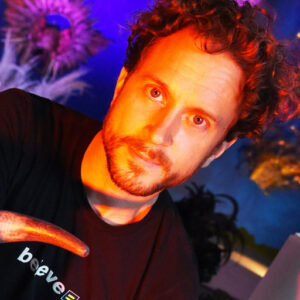 |
Darrell Thorne works in nightlife, theatrical, and private events in NYC, nationally, and internationally. He was a featured artist-in-residence at the Park Avenue Armory Gala in 2016, 2017, and 2019. He and his company are regular performers at events throughout the city for institutions including Lincoln Center, Brooklyn Academy of Music, and several foundations. Darrell presented a lecture to Instructor of Art Scott Andrew’s “Activated Animorphs” class in the STUDIO for Creative Inquiry, as well as performing a new work at the Warhol Museum theater. |
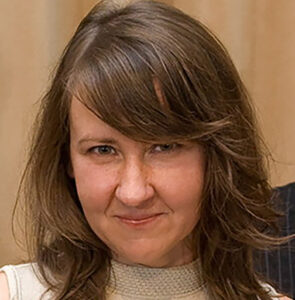 |
Suzanne Thorpe is a composer/performer, researcher and educator who lives at the foot of the Catskill mountains, on the banks of the Hudson river in New York. She creates compositions with a variety of media and technology, and performs primarily with electroacoustic flute and electronics. Her work, in all its forms, listens for and performs our cultural and material navigations and transformations in sound. Suzanne Thorpe was invited by Professor of Music, Annie Hui-Hsin Hsieh to visit the students of Exploded Ensemble and help develop their work for the semster. |
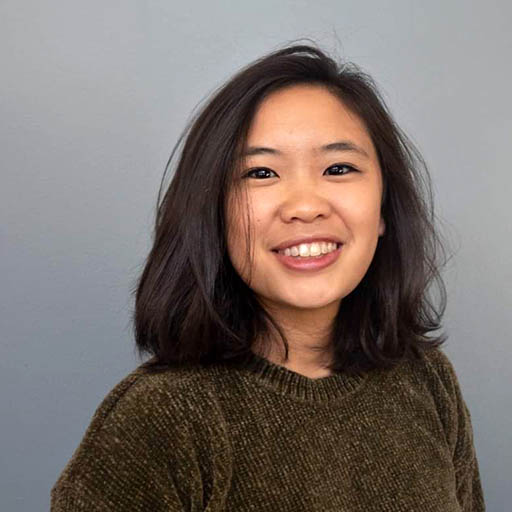 |
Vi Trinh works in digital and traditional media to examine the relationship between ecological and social patterns. A Vietnamese-American artist based in Washington, DC, Trinh graduated from the University of Richmond in 2019 with a B.A. in Visual and Media Arts Practice & Leadership. She is currently a MFA Fine Arts candidate at Goldsmiths University of London. Much of Trinh’s work is based in and on the Internet. Through her interactive digital art, Trinh explores dynamics of power and control, freedom and restraint, and how they manifest in networked media. Themes in Trinh’s work include aesthetics in ecological emergency; new temporal realities created by very large-scale phenomena; and the contradiction between the Internet as a seemingly free and democratic space, and the reality of the Internet as a site of exclusionary design, extractive corporatization, technologized colonialism, and the perpetuation of white supremacy. Trinh presented as part of the STUDIO’s “Shall Make, Shall Be” artist lecture event. |
 |
Veil Machine is a sex worker art collective exploring intimacy through lies, authenticity through commodification, and the digital as the real. At its core, sex work, like artwork, is about the interplay between fantasy and reality, intimacy and lies. The Veil Machine, like the sex worker and artist, manipulates through masks. Our group uses a relational and intimate practice to explore these dynamics through art actions. Veil Machine was invited by MFA Candidate Lena Chen to facilitate a panel with Hacking/Hustling collective on cybersecurity and deplatforming. |
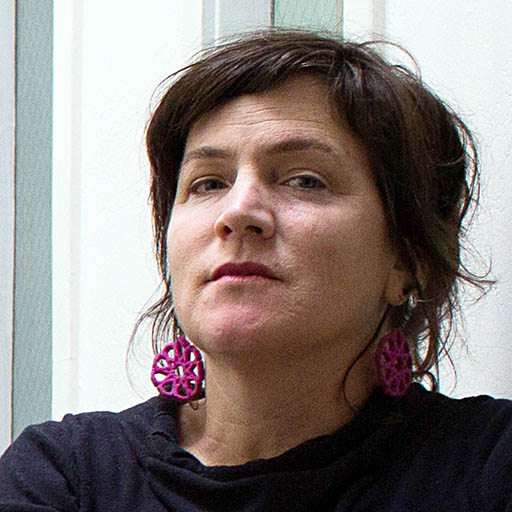 |
Lexa Walsh makes projects, exhibitions, publications and objects, employing social engagement, institutional critique, radical hospitality and community building. Her upbringing as the youngest child of fifteen informs her work, as does practicing collectivity while coming of age in the post-punk scene of the 1990’s Bay Area. Embedded in her practice, she works as an arts laborer, organizer, curator and archivist. Walsh has founded or co-founded several arts platforms, including the Heinz Afterworld Lounge, an experimental music venue; Toychestra, an all-women, all-toy instrument ensemble; Oakland Stock, a branch of the Sunday Soup crowdfunding network; and most recently, the Bay Area Contemporary Arts Archive, a platform for the preservation of arts ephemera. Walsh has also worked as an artist-in-residence and/or curator at a variety of arts institutions, including a term as Social Practice Artist-in-Residence at the Portland Art Museum, and several years as a curator and administrator at CESTA, a Czech art center. She holds an MFA from Portland State University’s Art & Social Practice program and a BFA from California College of Arts and Crafts. Walsh presented as part of the STUDIO’s “Shall Make, Shall Be” artist lecture event. |
